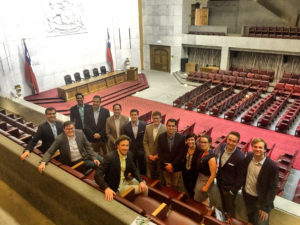The Regulation of Private Investments in Chile

For the second year in a row, Stanford has stunned me with its ability to provide its students with unforgettable foreign learning opportunities. Last year, I had the privilege of traveling to Beijing with Professor Marcus Cole to compare the regulation of private investment in China and the U.S. This year, I flew to Santiago, Chile, with Professor George Triantis and [Lecturer in Law] Evan Epstein to study how corporate transactions are structured there as compared with the U.S., learning a good deal about the country itself in the process. Given that I’ll be practicing abroad in Tokyo after graduation the international perspective granted by each of these trips has been absolutely invaluable. And each time, the experience was enlightening in ways both expected and not.
Our academic schedule was rigorous yet engaging. We had the complicated merger of LAN and TAM, at the time the two largest airlines in South America, explained to us by the outside counsel for LATAM Airlines Group, S.A., the resultant holding company, headquartered in Santiago.
Afterward, we met with LATAM’s general counsel to learn more about the deal’s history and dynamics. Presentations at the American Chamber of Commerce, Chilean branch, taught us about the history and progress of Chile’s economic policy as well as overarching corporate governance trends. In the Chilean Congress, we watched a debate on a newly proposed labor law, spoke with the head of the House of Representatives about the challenges currently facing the reformist government of President Michelle Bachelet, and discussed the need for education reform with two leading congressmen. Next, the architects of the recent tax reform explained its necessity and mechanics to us at the Ministry of Finance. Going to Chile was by no means a purely passive learning exercise, though. At least once a day, we would meet up with Chilean students, our counterparts from the Pontificia Universidad Católica de Chile, one of the top law schools in the region, to work through case studies of actual South American deals as a class. Afterward, we would grab lunch together or just hang out on the beautiful campus, learning about law school life on the other side of the equator.
While the main focus of our trip was certainly academic, immersing ourselves in the culture and forming new connections were also important. We toured one of Chile’s finest wineries, Kingston Family Vineyards, with its proprietor Courtney Kingston (MBA ’99) who gave us the lowdown on doing business in Chile and the idiosyncrasies of the wine industry, in general. The world shrunk to the size of a handshake when I met an engineer from Mountain View who was taking advantage of the Chilean government’s offer to fund foreign entrepreneurs through the national accelerator, Startup Chile. We discussed life after Stanford with alumni over pisco sours and admired the curios peopling the walls of poet and diplomat Pablo Neruda’s two homes, dedicated to his lover, Matilde.
What was the trip to Santiago like? An amazing escape from the usual with unusually amazing people. It was Stanford living up to its reputation as a leader in innovative legal education and facilitating bonds both personal and professional across the globe. My advice to students with time left or about to join the Farm: If you get the chance, take it. SL
